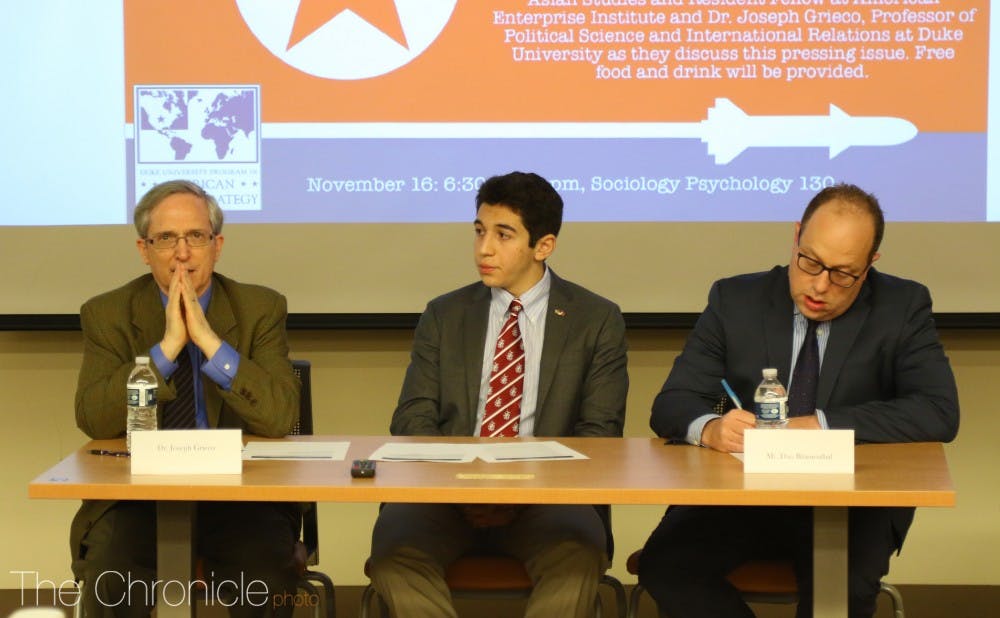New wisdom and new strategies are in need to mitigate the North Korea nuclear threat, experts said at a panel Thursday
Dan Blumenthal, director of Asian Studies at the American Enterprise Institute and Law ’00, and Joseph Grieco, professor of political science, debated the prospects of the North Korea nuclear crisis at a panel Thursday hosted by the Alexander Hamilton Society. They discussed the possible reasons why the U.S. has made little headway on denuclearization, as well as the likelihood of nuclear terrorism due to the uptick in nuclear weapons possession.
“The United States managed to negotiate with the Soviet Union [over using nuclear weapons] during the Cold War,” Grieco said. “It’s now time to relearn the old lessons and draw some new lessons.”
Traditional diplomatic measures such as striking a nuclear deal with North Korea are not likely to be effective, Blumenthal said. North Korea politicians do not reason like politicians in most democratic countries do.
“In the United States, we are used to give-and-take and compromising,” Blumenthal said. “But that’s not how most countries in the rest of the world think about things.”
Blumenthal added that North Korea is an authoritarian and quasi-religious country that refuses to engage in globalization. The United States must first understand the nature of the North Korean regime in order to successfully resolve the nuclear crisis.
Both Iraq's Saddam Hussein and Libya's Moammar Gadhafi regimes were toppled after the two leaders agreed to give up their nuclear programs, Blumenthal said. North Korea may have learned from their experiences and taken a more offensive approach.
Despite the size of the U.S. military budget, military confrontation is too costly and not feasible for the United States, Blumenthal cautioned.
“$600 billion seems huge,” Blumenthal said. “But unlike other countries that only focus on their own defense, we are operating a global military strategy.”
To mitigate the crisis, Grieco suggested that the U.S. might depend on other countries in East Asia. However, he added that said countries may not necessarily follow the U.S.'s instructions.
For example, North Korea has developed an intercontinental ballistic missile to directly target the U.S. mainland, Grieco said. However, South Korea and Japan are concerned that the United States will exchange their security for its own, and may hesitate to do America's bidding.
More generally, Grieco suggested, the United States has made limited progress in mitigating the North Korea nuclear threat simply because it has little leverage to negotiate with North Korea and China.
“We need to attain something that will make [North Korea and China] willing to take the issue off the table,” Grieco said. “But we don’t have much to offer now.”
On the other hand, China may benefit from the tension between the U.S. and South Korea and Japan, which could explain why it has not moved to help denuclearize North Korea.
“The only change [to mitigate the crisis] is to change China’s calculus,” Blumenthal said.
The United States could persuade China to react to the crisis by establishing a military encirclement to contain China in Asia, Blumenthal noted. It could also help Japan and South Korea develop their own nuclear power to intimidate China, though the latter measure is less realistic.
In the meantime, Blumenthal and Grieco both expressed concern about the likelihood of nuclear-enabled terrorism given that terrorist groups may obtain nuclear weapons from North Korea and apply them in terrorist activities.
“North Korea will sell anything to anyone anywhere and anytime,” Blumenthal said. “Nuclear terrorism is definitely more possible today that it was years ago.”
Grieco added that nuclear terrorism is more dangerous than the nuclear crisis in Korea. Both the identities and requests of terrorists tend to be vague, making it hard to respond to such threats.
Additionally, the United States does not even have an effective agency to communicate with the North Korea leadership, Blumenthal said. The next step to mitigate the crisis is to establish an information agency to connect with and collect information from North Korea.
“Most of the options we have on the table are suboptimal,” Blumenthal said. “But we need to try our best to cope with this imminent threat.”
Get The Chronicle straight to your inbox
Signup for our weekly newsletter. Cancel at any time.

